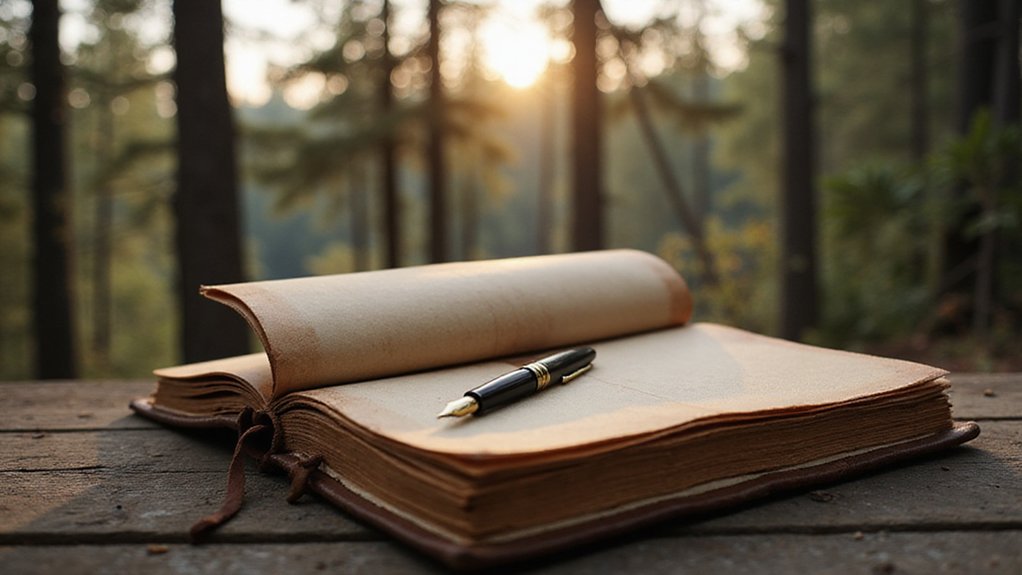Keeping a hunting journal can greatly enhance your experience in the field. It allows you to track your progress, reflect on your outings, and develop better strategies for future hunts. You might wonder where to begin or what details are truly worth noting. Understanding how to structure your entries and the importance of consistency can make all the difference. Let’s explore what you need to know to create a valuable hunting resource.
What Are Hunting Journals and Why Are They Important?
Hunting journals are essential tools for any serious hunter, as they help you track your experiences, observations, and lessons learned in the field.
These journals serve as a personal record, allowing you to document factors like weather conditions, animal behavior, and successful techniques. By reviewing your entries, you can identify patterns and improve your strategies for future hunts.
Additionally, they foster a deeper connection to your environment and the wildlife you pursue. A journal also captures memories and stories, creating a valuable keepsake to reflect on your journey as a hunter.
In short, they’re a must-have for growth and success.
How to Start Your Hunting Journal
Starting your hunting journal is an exciting step toward enhancing your skills and capturing your experiences.
Begin by choosing a notebook or app that feels comfortable for you. Set aside time after each outing to jot down your thoughts. Don’t overthink it—just write freely about your day.
Consider the weather, terrain, and your feelings during the hunt. You might also want to include sketches or photos to make it more personal.
What Should You Include in Your Hunting Journal?
A well-crafted hunting journal serves as a valuable tool in tracking your experiences and growth as a hunter.
Start by noting the date, location, and weather conditions for each outing. Include details about the animals you encounter, their behaviors, and any signs of their presence.
Document your gear, techniques, and strategies used during the hunt, as well as what worked and what didn’t. Reflect on your feelings, challenges faced, and lessons learned.
Additionally, consider jotting down any observations about the environment and other wildlife. This thorough approach will help you become a more skilled and insightful hunter over time.
How to Effectively Record Your Hunting Experiences
Recording your hunting experiences effectively can elevate your skills and deepen your connection to the sport. Start by jotting down the date, location, and weather conditions right after each outing.
Capture details about the animals you encountered, their behavior, and any missed opportunities. Reflect on what worked and what didn’t, noting gear performance and techniques used.
Use sensory details—sounds, sights, and smells—to paint a vivid picture of your experience. Don’t forget to include your feelings and thoughts; these reflections will enrich your journal.
Regularly revisiting these entries can provide valuable insights for future hunts.
Why Consistency Matters in Keeping a Hunting Journal
Consistency in keeping a hunting journal is essential for tracking your growth and honing your skills.
Regular entries help you notice patterns and improve your techniques over time. When you consistently document your hunts, you capture:
- Weather conditions that affect animal behavior
- Locations that yield successful encounters
- Equipment performance during different scenarios
- Personal reflections that enhance your mindset
How to Use Your Hunting Journal to Improve Skills
While you might think of your hunting journal as just a record of your outings, it can actually serve as a powerful tool for skill improvement.
By reviewing your entries, you can identify patterns in your successes and failures. Note specific techniques, weather conditions, and animal behaviors that led to a successful hunt. Regularly analyzing this information helps you make informed adjustments for future outings.
Additionally, you can set goals based on your observations, tracking your progress over time. Your journal becomes a personal roadmap, guiding you toward becoming a more skilled and effective hunter with each entry you make.
What Tools and Materials Do You Need for Your Journal?
A well-equipped hunting journal can greatly enhance your documentation experience. To get started, gather essential tools and materials that will make recording your adventures enjoyable and efficient:
- A durable notebook, designed for outdoor conditions
- A reliable pen or pencil that writes smoothly, even in wet weather
- A small, portable camera for capturing memorable moments in the field
- A sturdy backpack or pouch to keep everything organized and protected
With these items, you’ll be prepared to document your hunts, observations, and reflections. This will make your journal not just a record, but a valuable companion on your hunting journeys.
How to Organize and Review Your Hunting Journal Entries
With your hunting journal equipped and ready, it’s time to focus on how to keep those entries organized and meaningful.
Start by creating sections for different types of hunts, locations, or species. Use dates and concise headings for easy reference.
When reviewing, read through your entries regularly to reflect on your experiences and note patterns or improvements. Highlight key insights, such as effective techniques or weather conditions.
Consider using color coding or tags to quickly locate specific entries. This organization not only enhances your hunting knowledge but also makes your journal a valuable resource for future hunts.
